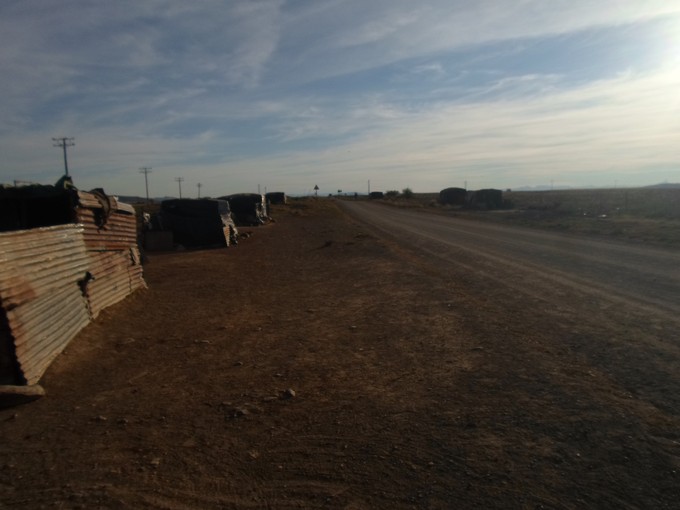Bleak future for Eastern Cape descendants of Karretjie people
They want better services, but municipality says they must move first
The descendants of the “Karretjie” people of the Karoo are demanding better service delivery from their municipality in the Eastern Cape.They are homeless and have been living at the side of a road for 36 years.
Their eight shacks, located at the side of a busy dust road, a few metres from the N10, trigger many questions from travellers passing by. The shacks are heaps of dilapidated pieces of wood covered with black plastic.
Located near Transnet’s Fish River railway station, 40 kilometers north of Cradock, the roadside dwellers complained to Groundup about their need for better services.
Recounting the origin of this small but tighly knit community of about twenty-five people, Regina Brenwell, 34, said her parents were the famous Karretjie people who traveled the Northern Cape with donkeys and carts.
She has a vivid memory of her childhood, growing up in a shack that is still her home today.
“Our parents established this settlement in 1980. They came from the Karoo where they worked on farms.They did not live in one area because they would move from one farm to another looking for work. Our parents travelled on donkey carts. Their homes were their carts and they revered their donkeys very much. They were good at sheep shearing and mending fences. The men who live here love this place because the farmers respect them for that.”
Brenwell, who dropped out of school doing her primary school, said her parents sold all their donkeys and carts after they got jobs on the surrounding farms on their arrival in 1980.
She said, though, that times have now changed and they should not continue living an isolated life. She also said that the shacks were not good for their health. She appealed to the municipal officials to help improve their lives.
“We don’t have toilets here.We scale the farm fences to use as bush toilets. We have to cross the N10 highway to fetch water from the Railway Station taps. This is dangerous, especially for children, because there are speeding vehicles. It is also very dark at night and our shacks are covered with black plastic that does not reflect in darkness,” she said.
Brenwell wants the municipality to install a mobile water tank.
Most of the residents speak only Afrikaans, but Brenwell also speaks isiXhosa. Literacy rates are low and no one can speak, read or write in English.
“We are always coughing because of dust caused by passing vehicles. This place is also waterlogged in winter. The soil is muddy when it is raining. We also have a problem of mosquitoes, and frogs and scorpions that crawl into our shacks at night. Winters are cold and windy. Our plastic [covered] houses freeze. We have small children here, hence the need for the municipality to help us.”
She believes that because of their illiteracy, jobs are difficult to find.
“Things are just getting tougher everyday. The farmers no longer give us jobs. Only a handful of men here are working on the farms. The only job that we get is to fix farm fences and sheep shearing which is seasonal,” Brenwell explained.
Brenwell interpreted between me and other residents.
Peto Uthaler, 28, wants to relocate to a better place. She said the municipal officials visited them a year ago and promised to build houses for them in Lingelihle township, Cradock.
“We also need houses like other citizens. They are getting better services than us. We have a primary school but there is no secondary school on these farms,” she said.
Meanwhile some residents do not want to leave their ancestors’ shacks by being relocated to Lingelihle township.
One resident, who would not give her name said, “We will go nowhere.The government should build us houses here. We grew up here. There is high crime and murder in Cradock. There are no jobs there. We have seasonal jobs here. The government should build better structures here, including taps and better houses.”
This view was echoed by a group of six young men cramped in one of the shacks. One of them said, “Our forefathers lived as a group and were proud about it. What we only need is for houses to be built here, at the place of our forefathers. … There is no employment in Cradock and the people are cruel there. We want to preserve our culture and tradition. Let those who want to go leave,” he said with the agreement of the group.
The Inxuba Yethemba Municipal manager, Mzwandile Tantsi, said efforts have been made before to relocate the residents. But these efforts failed. He said the municipality does not own the land the residents are on and therefore cannot develop it. “The matter has been coming up for years,” he said.
Tantsi said that not only the municipality but other government departments as well as community organisations have been trying to assist. “At some stage they were offered houses in the hillside which were refused for the same reasons: they want to be close to where they can access work on farms. The laws of the country provides guidelines for evictions, and under the circumstances this is not an option currently.”
He said the municipality will continue trying to persuade the residents to be relocated in a dignified manner.
Support independent journalism
Donate using Payfast

Don't miss out on the latest news
We respect your privacy, and promise we won't spam you.
Next: Why we are taking the Minister of Police to court
Previous: Enkanini residents protest at police failure to find missing woman
© 2016 GroundUp. 
This article is licensed under a Creative Commons Attribution-NoDerivatives 4.0 International License.
You may republish this article, so long as you credit the authors and GroundUp, and do not change the text. Please include a link back to the original article.

